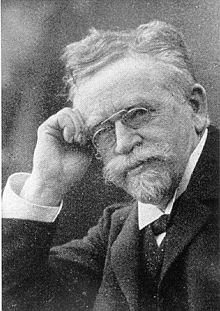fiction.wikisort.org - Writer
Johann Heinrich Hübschmann (1 July 1848 – 20 January 1908) was a German philologist.
Heinrich Hübschmann | |
|---|---|
 | |
| Born | 1 July 1848 Erfurt, Prussia |
| Died | 20 January 1908 (aged 59) Freiburg im Breisgau, German Empire |
| Nationality | German |
| Occupation | Philologist |
| Known for | Research on the Armenian language |
Life
Hübschmann was born on 1 July 1848 at Erfurt. He studied Oriental philology at Jena, Tübingen, Leipzig, and Munich; in 1876 he became professor of Iranian languages at Leipzig, and in 1877 professor of comparative philology at Strasbourg. Hübschmann died on 20 January 1908 in Freiburg im Breisgau.
Research on the Armenian language
Hübschmann was the first to show in 1875 that the Armenian language was not a branch of the Iranian languages (earlier assumed so because of the immense amount of Iranian influence on Armenian throughout its history) but an entirely separate Indo-European branch in its own right.[1][better source needed] He used the comparative method to separate the Iranian loanwords, which make up the majority of Armenian words, from an older layer of native Armenian words.[2]
Works
- "Ueber die Stellung des Armenischen im Kreise der indogermanischen Sprachen" (1875)
- Armenische Studien (1883)
- Das indogermanische Vokalsystem (1885)
- Etymologie und Lautlehre der ossetischen Sprache (1887)
- Persische Studien (1895)
- Armenische Grammatik. I. Theil. Armenische Etymologie. I. Abtheilung: Die persischen und arabischen Lehnwörter im Altarmenischen. Leipzig, 1895
- Armenische Grammatik. I. Theil. Armenische Etymologie (Bibliothek indogermanischer Grammatiken. Band VI), Leipzig, 1897
- Altarmenische Ortsnamen (1904)
References
- "A Reader in Nineteenth Century Historical Indo-European Linguistics: On the Position of Armenian in the Sphere of the Indo-European Languages". Utexas.edu. 20 March 2007. Archived from the original on 21 December 2015. Retrieved 9 December 2015.
- Schmitt, Rüdiger & Bailey, Harold Walter (2011) [1986]. "Iranian influences in Armenian Language". In Yarshater, Ehsan (ed.). Encyclopædia Iranica (Online ed.). Encyclopædia Iranica Foundation. Retrieved 9 December 2015.
The revolutionary element in Hübschmann’s procedure was that according to him Arm. words fully or largely agreeing with Ir. forms in phonetic shape were suspect of being loanwords and could therefore not safely be regarded as genuine Arm. words. It was due to this methodological principle, which only gradually gained universal acceptance, that Hübschmann became the significant pioneer in the study of Ir. borrowings in Armenian.
Attribution
![]() This article incorporates text from a publication now in the public domain: Gilman, D. C.; Peck, H. T.; Colby, F. M., eds. (1905). "Hübschmann, Johann Heinrich". New International Encyclopedia (1st ed.). New York: Dodd, Mead.
This article incorporates text from a publication now in the public domain: Gilman, D. C.; Peck, H. T.; Colby, F. M., eds. (1905). "Hübschmann, Johann Heinrich". New International Encyclopedia (1st ed.). New York: Dodd, Mead.
На других языках
[de] Heinrich Hübschmann
Johann Heinrich Hübschmann (* 1. Juli 1848 in Erfurt; † 20. Januar 1908 in Freiburg im Breisgau) war ein deutscher Orientalist. Er war der Begründer der modernen armenischen Linguistik.- [en] Heinrich Hübschmann
[ru] Хюбшман, Генрих
Ге́нрих Хю́бшман (Гю́бшман), (нем. Johann Heinrich Hübschmann; 1 июля 1848, Эрфурт — 21 января 1908, Страсбург) — немецкий филолог.Другой контент может иметь иную лицензию. Перед использованием материалов сайта WikiSort.org внимательно изучите правила лицензирования конкретных элементов наполнения сайта.
WikiSort.org - проект по пересортировке и дополнению контента Википедии